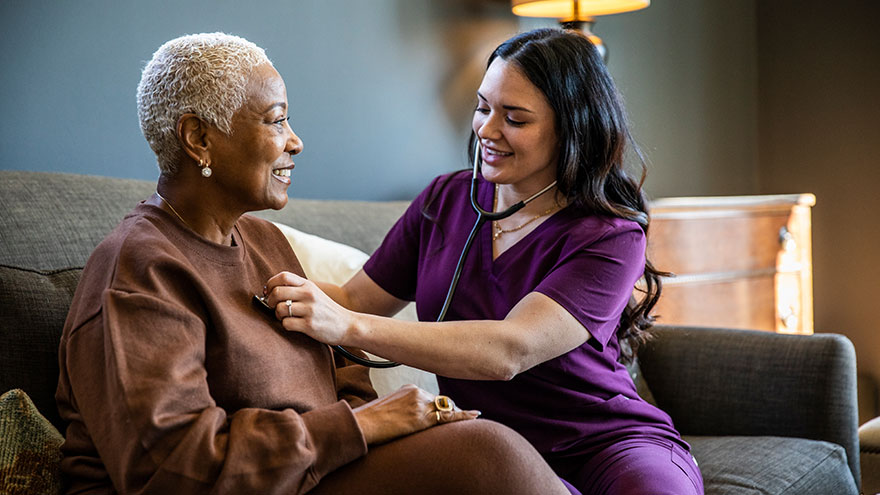Buscar
-
5 Things to Know About Women’s Heart Disease
Heart disease is more common in women than many people think. In fact, it is the leading cause of death in the United States, ahead of cancer and stroke. However, the common signs and symptoms we often associate with men and heart disease don’t always align with women. Thankfully, Renown Health is home to the first women’s heart center in Nevada. The Helaine Greenberg Women’s Heart Center gives women in our community the opportunity to receive exemplary care and education. “At the Women’s Heart Center, we are proud to offer the women of our community the treatments, therapies and education they need to fight this silent killer,” Dr. Danish Atwal. 1. The warning signs for heart disease present differently in women than they do in men. Both men and women may experience chest pain during a heart attack, but the similarity of symptoms ends there. Heart disease is especially problematic for women because more than half of women who die of heart disease have no symptoms at all. Women tend to have subtler symptoms that mimic symptoms associated with common, mild illnesses: Fatigue or weakness Pain, pressure or tightness in the center of the chest Pain that spreads to the upper body, neck or jaw Sweating, nausea or vomiting Sudden dizziness Shortness of breath Trouble sleeping 2. Women are often not treated with the same medications as men, even when they should be. Women are less likely to receive heart medication because their disease is often misdiagnosed or because they do not seek proper care. According to a study done by Harvard Health Publishing in 2020, “A general lack of awareness of women’s heart disease may lead to doctors or patients missing heart attacks in women or delaying their diagnosis. For example, while the frequency of cardiovascular disease tends to be lower in women before menopause than in men, the frequency dramatically increases after menopause, when it accounts for approximately one out of every three deaths in women. 3. Women who have hypertension, high cholesterol, type 2 diabetes or gestational diabetes during pregnancy are at a higher risk of a heart attack in the future. Women who experienced complications related to developing high blood pressure or hypertension during pregnancy had a 63% increased risk for developing cardiovascular disease later in life, as stated by research funded by the National Heart, Lung, and Blood Institute. According to that same study, researchers found that early screenings and monitoring in four target areas – blood pressure, cholesterol levels, glucose levels and body mass index – could provide even more personalized targets to help delay or possibly prevent future cardiovascular events among women.
Read More About 5 Things to Know About Women’s Heart Disease
-
10 datos que quizás no conozca sobre la atención de urgencia
Visiting a Renown Urgent Care location is an excellent option when you have a non-severe condition, such as a skin rash or sore throat, can't get in to see your primary care provider in a timely manner or if you need an appointment after regular business hours. To learn more about the ins and outs of Urgent Care, we spoke to David Lemak, MD, Division Chief Urgent Care, who let us know some reasons to visit Urgent Care, how to make your visit as efficient as possible, and more. Remember, for a life-threatening emergency, call 911 immediately! Urgent Care is similar to a Primary Care provider Urgent Care providers can do most of the things your Primary Care provider can do, with visits billed the same as an office visit. If you could put the word “severe” in front of your reason for visiting Urgent Care, please go to the emergency department right away For a list of what is an appropriate visit for Urgent Care click here. Also, we recommend that babies 2 months old and younger should go to the Renown Children’s Emergency Department, not Urgent Care. Renown Health has 10 Urgent Care locations across northern Nevada There are five locations in Reno, two in Sparks, one in Carson City, one in Fernley and one in Fallon. For a complete list of Renown Urgent Care locations, click here. Many of your Urgent Care needs can be accomplished via a virtual visit, from the comfort of your home or office Conditions Appropriate for a Virtual Visit Included: - Common cold and cough symptoms - Muscular, tendon or joint pain not cause by injury - Allergy or sinus symptoms - Pink eye - Urinary discomfort - Backache - Sexually transmitted illness screening - Rashes or skin sores - Medication refills (no controlled substances) Some conditions are not appropriate for a virtual visit. They include: - Chest or abdominal pain - Shortness of breath - Traumatic injuries - Dizziness or confusion - Bleeding - High fever - Persistent vomiting - Loss of vision - Substance abuse or psychiatric problems Book ahead for shorter wait times, but remember walk-ins are always available. Click here to make your appointment. This booking page conveniently shows the next available appointment at each location. Typically, mornings and late afternoon (right before dinner time) have the shortest wait times if you plan on walking in. You will be asked to wait in your car when you arrive at a Renown Urgent Care facility. While you wait (or even before you arrive), patients are encouraged to complete all registration paperwork and co-pay information online. Urgent Care is great for visits such as back-to-school physicals, camp physicals, commercial motor vehicle exams and more. Sometimes you cannot get in to see your primary care provider to meet the last-minute deadlines for certain school or work-related physicals. Many of these appointments can be completed at Urgent Care; we just recommend you call ahead and confirm that our facility offers what you need. An Urgent Care provider can virtually order a PCR COVID-19 test. Whether you have a possible exposure, are not feeling quite like yourself or need a negative test for upcoming travel, a COVID-19 test can be ordered for you. The cost for a visit to Urgent Care is dependent on your benefits, but the visit is billed the same as a standard office visit. If you don’t have insurance, a basic visit to a Renown Urgent Care will cost $125.
Read More About 10 Things You Might Not Know About Urgent Care
-
Cinco consejos para mantener la salud mental mientras busca empleo
It is no secret that looking for a new job can be stressful and overwhelming. Yet a record number of Americans are quitting their jobs to look for new opportunities, a trend also known as the “Great Resignation.” While there are many reasons why someone might be on the hunt for new work, it’s important for all job hunters to check in with their mental health regardless of their job hunting circumstances. To learn more about maintaining your mental health while looking for a new job, we spoke to Dr. Mavis Major, a Licensed Clinical Social Worker and Behavioral Health Therapist at Renown Health. 1. Identify Goals When beginning your job-hunting journey, your first step should be to make a plan that focuses on quality over quantity. Make lists of companies you would like to work for and, if you’re looking to change fields or industries, make a list of careers that interest you. At this stage in the process, it’s also important to determine what salary range you’re looking for, what type of work environment you want (in-person, remote or hybrid) and understand what benefits are important to you. Identifying goals makes it easier to narrow down the list of jobs you apply for so you can produce quality applications rather than frantically applying for jobs without putting thought into the process. 2. Set Boundaries It does not matter if you are working full-time while applying for jobs or if applying is your job right now; it can be easy to get lost in the stress of it all. For that reason, it is essential to set intentional boundaries throughout the process. This can look like scheduling days that you fully take off from the job search or going for a walk before a big interview to clear your head. Setting boundaries will make you more productive overall and hopefully help you get your mind off the process. 3. Ask For Help Do not try and tackle this undertaking on your own. Once you have identified goals (see tip #1) make lists of people you know within those industries, and do not be afraid to reach out. Of course, never be afraid to reach out to a mental health professional to talk through why this process might be making you feel anxious. Talking to someone who is not your friend or family can give you a different perspective.
Read More About Five Tips for Maintaining Your Mental Health While Job Hunting
-
How to Talk to Your Vaccine-Hesitant Friends About Getting Vaccinated Against COVID-19
Roughly 59% of eligible Nevadans are fully vaccinated against COVID-19 as of mid-September. That number is up 9% from only a month ago, but our work is far from done! One of the most powerful ways to convince someone to get vaccinated is for a person they trust and respect to take the time and have that complicated conversation with them. We know these conversations can be daunting, so we consulted Marie McCormack, MD, Primary Care Division Chief at Renown, about the six best ways to approach and frame these conversations to be productive and effective. 1. Be firm, but not aggressive. 2. Listen to what they have to say, and don’t assume you know why they haven't gotten the vaccine yet. 3. Cater your responses to their concerns. The CDC even has a helpful reference table identifying main reasons people are not getting vaccinated. If they are scared, offer to go with them. If they are not worried about getting sick, explain that they are more at risk of infecting those around them who are more likely to have a severe reaction to the virus. If they don’t know how to make an appointment, help them find the most convenient time and place for their schedule. If they are worried about how fast the vaccine was developed, remind them that the mRNA technology used in these vaccines has been studied for years. If they are worried the vaccine will affect fertility, tell them that in August the CDC officially recommended that pregnant people can get vaccinated. 4. When in doubt, hit them with the stats! 1 in 500 Americans has died from COVID-19. Vaccinated people are nearly five times less likely to get infected, according to the CDC. Vaccinated people are 10 times less likely to get so sick they ended up in the hospital, according to the CDC. 5. Remind them of all the things they might not be able to do if they aren't vaccinated. Attend concerts or sporting events Travel Potentially even keep their job 6. When all else fails, use the tough love approach. Tell these people you don’t feel comfortable meeting with them in person until they are vaccinated.



